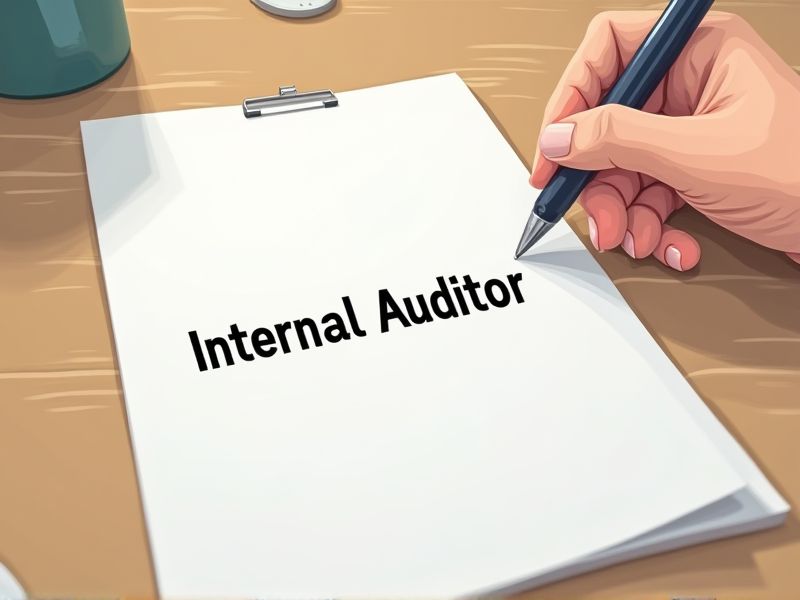
Internal auditors play a crucial role in ensuring organizations adhere to compliance, governance, and risk management standards. Certain certifications enhance their proficiency, validating their knowledge and professional credibility. These credentials also position them to navigate the complexities of evolving financial regulations effectively. Consider these important certifications that can benefit an internal auditor.
Certified Internal Auditor (CIA)
The CIA designation provides internal auditors with an internationally recognized credential that signifies expertise and credibility in the field, leading to enhanced professional reputation. Companies increasingly rely on certified professionals to align internal audit practices with global standards, reducing risks and improving governance. Data shows that individuals with the CIA certification often command higher salaries, creating financial incentives for auditors to pursue the credential. Organizations benefit from having CIAs on staff as it often results in more effective audits, which can lead to improved operational efficiencies and compliance.
Certified Information Systems Auditor (CISA)
Having a Certified Information Systems Auditor (CISA) credential increases an internal auditor's expertise in assessing and managing information systems, which are integral to most business operations. This certification provides in-depth knowledge and skills in IT risk management, ensuring that an organization's information systems align with business objectives. With increasing reliance on complex digital systems, the CISA designation helps auditors identify potential vulnerabilities and inefficiencies. Organizations gain confidence in their internal controls and processes when employing auditors with CISA certification, promoting operational integrity.
Certified Fraud Examiner (CFE)
The presence of a Certified Fraud Examiner (CFE) enhances an internal auditor's ability to detect and prevent fraud, as CFEs possess specialized skills in recognizing fraudulent activities. Internal auditors with CFE credentials bring a deeper understanding of financial anomalies, enabling more accurate risk assessments and fraud prevention strategies. The CFE training equips auditors with legal knowledge critical for investigations, ensuring compliance with regulations during audits. Organizations benefit from increased trust and integrity in financial reporting, as CFEs help secure the company's assets and reputation against fraudulent threats.
Certification in Risk Management Assurance (CRMA)
Obtaining the Certification in Risk Management Assurance (CRMA) equips internal auditors with advanced skills necessary to evaluate and enhance risk management practices. Enhanced expertise in risk management allows auditors to offer more insightful recommendations, thereby improving organizational governance. Organizations increasingly demand CRMA-certified auditors due to their specialized ability to identify and address potential risks effectively. Certification demonstrates a commitment to professional growth, improving job prospects and career advancement opportunities in the field of internal auditing.
Certified Government Auditing Professional (CGAP)
Possessing the Certified Government Auditing Professional (CGAP) credential enhances an internal auditor's understanding of government-specific auditing standards, ensuring compliance with regulations. This certification sharpens skills in risk assessment, which is crucial for identifying potential fiscal issues within governmental entities. Employers value CGAP-certified auditors for their expertise, potentially leading to increased career opportunities. A CGAP-certified auditor is likely more adept at improving transparency and accountability within government operations.
Certified in Financial Forensics (CFF)
Internal auditors benefit from the CFF certification because it deepens their understanding of fraud detection and financial misrepresentation. Enhanced skills in financial forensics improve an auditor's ability to identify irregularities, strengthening the organization's internal controls. Specialized knowledge from the CFF certification supports more effective risk assessments, reducing potential financial losses. In the competitive field of internal auditing, holding a CFF credential could lead to career advancement and increased professional credibility.
Certified Quality Auditor (CQA)
Having a Certified Quality Auditor (CQA) ensures the internal auditor possesses a standardized understanding of quality auditing principles. This certification validates the auditor's capability to identify weaknesses and improvement areas within processes. Organizations benefit from more reliable audits, leading to enhanced process efficiency and compliance. CQA-certified auditors also bring credibility and trustworthiness to the auditing function, reassuring stakeholders of audit integrity.
Certified in Risk and Information Systems Control (CRISC)
Internal auditors require Certified in Risk and Information Systems Control (CRISC) because it equips them with the skills to identify and assess IT risk, which is crucial in evaluating a company's overall audit process. CRISC certification helps internal auditors develop and implement risk management strategies that align with organizational goals. The certification also ensures that auditors can design and maintain information system controls effectively, which is vital for ensuring data integrity and compliance. Knowledge acquired through CRISC enhances an internal auditor's ability to provide informed recommendations for mitigating risks efficiently.
Lean Six Sigma Green Belt (LSSGB)
Internal auditors who hold a Lean Six Sigma Green Belt can identify inefficiencies within processes, thereby enhancing audit effectiveness. Their training equips them with the skills to apply data-driven decision-making, leading to more accurate assessments of control environments. The structured problem-solving approach inherent in Lean Six Sigma enables auditors to drive and support continuous improvement initiatives across the organization. By integrating LSSGB methodologies, internal auditors contribute to reducing waste and improving compliance, thereby adding significant value to the overall operational efficiency.
Project Management Professional (PMP)
Having a PMP certification enhances an internal auditor's project management skills, leading to more efficient and effective audit processes. The structured framework provided by PMP aids in improved planning and execution of audit projects, minimizing errors and optimizing resource allocation. Internal auditors with PMP credentials can better manage time constraints and stakeholder expectations, often resulting in more timely and accurate audit outcomes. The comprehensive understanding of risk management and quality control within PMP processes aligns well with the internal auditor's responsibilities, reinforcing their ability to identify and mitigate risks within projects.
Summary
When you, as an internal auditor, obtain certifications, your professional credibility can increase significantly. With enhanced skills and updated knowledge, you can perform more efficient and thorough audits. This depth in auditing may lead to improved risk management and optimized organizational performance. Consequently, such expertise often opens doors for career advancement and higher remuneration.
